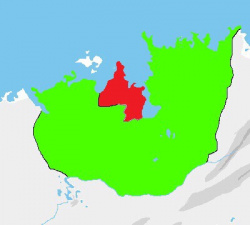Difference between revisions of "Archive:Ebo Aga Empire"
K1234567890y (talk | contribs) m |
K1234567890y (talk | contribs) m (→See also) |
||
| Line 158: | Line 158: | ||
==See also== | ==See also== | ||
* [[The Five Ebo Aga Kingdoms]] | |||
[[Category:Former countries]] | [[Category:Former countries]] | ||
[[Category:Former countries in Baredina]] | [[Category:Former countries in Baredina]] | ||
[[Category:History of Ebo Nganagam]] | [[Category:History of Ebo Nganagam]] | ||
Revision as of 19:43, 3 March 2016
| The Ebo Aga Empire | |||||
| Ebo Aga | |||||
| |||||
Ebo Aga Empire(green) at its peak, ca. 1550 AD, the red part is the Q'eb Empire
| |||||
| Capital | Not specified | ||||
| Languages | Ebo Nganagam language | ||||
| Government | Monarchy | ||||
| History | |||||
| • | Established | ca. 1500 | |||
| • | Disestablished | ca. 1700 | |||
| b. | ... | ||||
The Ebo Aga Empire was a great empire that existed between 1500 AD and 1710 AD, when it eventually fragmented into five kingdoms.
The Ebo Aga Empire is the first and only known empire founded by Ebo Nganagam people, and it is known that the Ebo Aga Empire encouraged ethnic Ebo Nganagam people to immigrate to all places controlled by the empire, and the Ebo Aga Empire also encouraged its people to have as many children as possible. The immigration and birth policy of the Ebo Aga Empire is generally thought to be the main reason why the Ebo Nganagam people are so numerous in the area of the Confederation of Ebo Nganagam.
Government
Not much is known about the governmental structure of the Ebo Aga Empire, but according to the official documents by the Meritocratic Republic of Myak Kham and the Q'eb Empire, the Ebo Aga Empire had at least two social classes: the aristocrats and the commoners, and it seems that both of the statuses of aristocrats and commoners were inherited, and all taxes of the country was paid by the commoners, and aristocrats had privileges to be governors or military officers.
Culture
The Resistance of Writing
The Ebo Nganagam people had a long tradition to resist any attempts to write their language, and the Ebo Aga Empire is not an exception, actually, it seems that the Ebo Aga Empire systemically rejected all attempts to write their language, and there are no written documents of the Ebo Aga Empire ever written in any dialects of the Ebo Nganagam language, even the Ebo Nganagam people who built the Ebo Aga Empire had actually been interacted with peoples who had a long literal tradition for a long time, this phenomenon, and the resistance of writing among the Ebo Nganagam people in general, has become a big mystery among anthropologists and historians.
Historians think the lack of writing system signifies that the Ebo Aga Empire lacks an effective mean to control over the whole country, and they also think that the lack of an effective mean to control over the country is a main reason the empire eventually fragmented into five countries.
According to research of some historians, the main reason behind such a mystery is that both of the nobilities and the commoners think the ability to write can be unbeneficial to them. Nobilities think writing can make laws hard to repeal or change, which can be unbeneficial to them; commoners think writing can make nobilities and the king strengthen their control over all kinds of resources, which can make them even harder to barely make a living, that means, the reason that people resist writing in the Ebo Aga Empire is different from the Ebo Nganagam people who live in tribes, as the main reason for Ebo Nganagam people who live in tribes to resist writing is that learning how to read and write wastes times.
